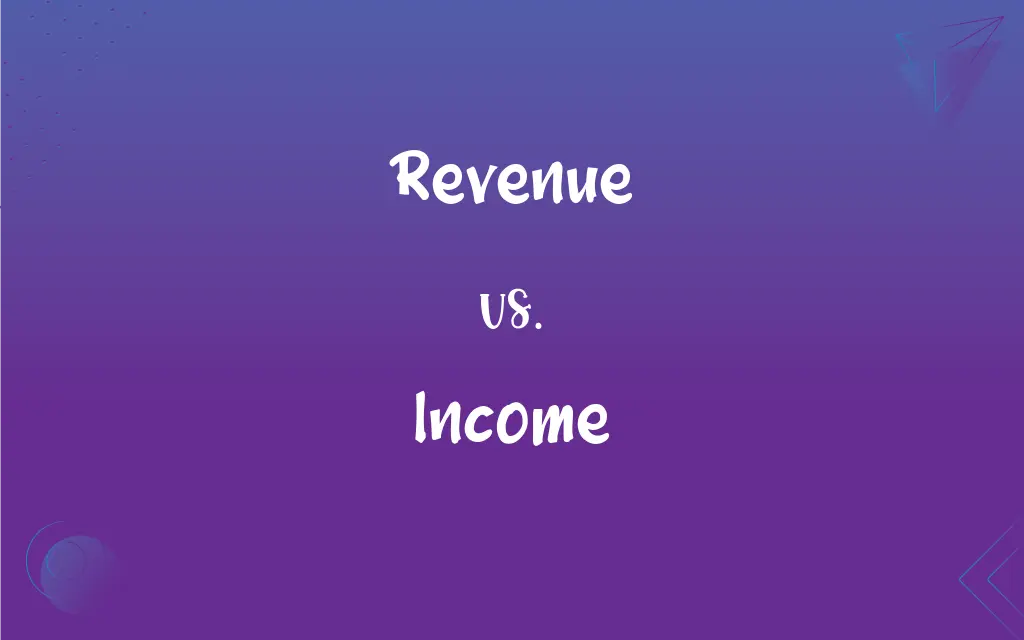Revenue vs. Income: What's the Difference?
Edited by Janet White || By Harlon Moss || Updated on October 26, 2023
Revenue is the total money earned from sales; income is the profit after expenses.

Key Differences
Revenue and income are financial terms frequently used in the business world. Revenue refers to the total amount of money generated by a business from its primary activities, such as the sale of goods or services. Income, on the other hand, represents the net earnings of a business after all expenses have been deducted from the revenue.
When discussing a company's financial health, both revenue and income play crucial roles. A high revenue indicates strong sales and potentially a dominant market position. However, even if a company has high revenue, it doesn't necessarily mean it's profitable. Income provides a clearer picture in this regard. If expenses surpass revenue, a company may report negative income, indicating a loss.
It's essential to realize that revenue doesn't account for the costs incurred in generating those sales. For instance, if a store sells a product for $100, that amount is its revenue from the sale. But, if it cost the store $70 to obtain and sell the product, its income from that sale is only $30.
Understanding the distinction between revenue and income can offer insights into a company's operational efficiency. Two companies might generate the same revenue, but the one with higher income is better at controlling its expenses. Conversely, a business with significant revenue but low income might have underlying issues needing attention.
Comparison Chart
Definition
Total money earned from sales.
Net profit after expenses.
ADVERTISEMENT
Reflects
Gross earnings from business activities.
Profitability of the business.
Calculation
Sum of all sales.
Revenue minus expenses.
Indicates
Sales performance.
Operational efficiency.
Impact of Expenses
Doesn't account for expenses.
Directly affected by expenses.
Revenue and Income Definitions
Revenue
Total earnings from goods sold or services provided.
The store's revenue for the month was $10,000.
ADVERTISEMENT
Income
The monetary amount an entity gains over time.
The increased sales led to a substantial rise in the company's income.
Revenue
The sum of all sales before any deductions.
Despite high traffic, the website's revenue remained consistent.
Income
Profit generated from various sources, including investments, employment, or business operations.
His annual income includes salary, dividends, and freelance work.
Revenue
Primary income source for businesses selling products or services.
The bakery's main revenue came from selling pastries.
Income
The net earnings of a business or individual after expenses.
After deducting all costs, the firm's income was $5,000.
Revenue
Financial inflow from business activities.
The revenue from the new product launch surpassed expectations.
Income
The amount retained after meeting all financial obligations.
The rental property provides a steady income each month.
Revenue
Gross amount collected from business operations.
The concert generated a revenue of $50,000 from ticket sales.
Income
Financial gain derived from both passive and active sources.
Diversifying sources of income can provide financial stability.
Revenue
The income of a government from all sources appropriated for the payment of the public expenses.
Income
The amount of money or its equivalent received during a period of time in exchange for labor or services, from the sale of goods or property, or as profit from financial investments.
FAQs
How does income differ from revenue?
While revenue denotes total sales, income is the profit after deducting all expenses.
Which is a better indicator of a company's profitability, revenue or income?
Income provides a clearer picture of a company's profitability.
If a business has no sales but has other earnings, does it have revenue?
Yes, revenue can come from various sources, not just sales.
Does revenue account for the cost of goods sold?
No, revenue is the gross amount, not accounting for costs or expenses.
Is rental money considered revenue or income?
Rental money is revenue, but after deducting associated expenses, what remains is income.
What does revenue refer to in business?
Revenue refers to the total money generated from sales or services before expenses.
Can an individual have income without having revenue?
Yes, an individual can have income from sources like investments or gifts, not necessarily from sales or services.
How can a company increase its income?
By increasing revenue, reducing expenses, or both.
Is interest earned by a company considered as income?
Yes, interest earned is a form of income.
Can an individual's salary be termed as revenue?
No, for individuals, salary is typically referred to as income.
Can a business operate with negative income?
Yes, but consistent negative income indicates financial problems.
Are dividends received by a company considered income?
Yes, dividends are a form of income for the recipient.
Can a company's income exceed its revenue?
No, income is derived from revenue after expenses; it cannot surpass revenue.
Is a loan received by a company considered revenue?
No, loans are liabilities and not considered revenue.
What impact do discounts have on revenue?
Discounts reduce the amount collected, thus decreasing revenue.
Are salaries and wages deducted from revenue or income?
Salaries and wages are expenses deducted from revenue to determine income.
What's a common metric to compare revenue and income of companies?
The profit margin, calculated as (Income/Revenue) x 100%.
Is all income taxable?
It varies by jurisdiction, but generally, many types of income are subject to tax, with certain exemptions.
Can a company have high revenue but low income?
Yes, if a company's expenses are high, it can have significant revenue but low or negative income.
Do taxes affect revenue or income?
Taxes are deducted from revenue, affecting the net income.
About Author
Written by
Harlon MossHarlon is a seasoned quality moderator and accomplished content writer for Difference Wiki. An alumnus of the prestigious University of California, he earned his degree in Computer Science. Leveraging his academic background, Harlon brings a meticulous and informed perspective to his work, ensuring content accuracy and excellence.
Edited by
Janet WhiteJanet White has been an esteemed writer and blogger for Difference Wiki. Holding a Master's degree in Science and Medical Journalism from the prestigious Boston University, she has consistently demonstrated her expertise and passion for her field. When she's not immersed in her work, Janet relishes her time exercising, delving into a good book, and cherishing moments with friends and family.
































































